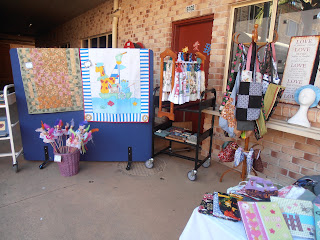My little world has been in chaos as we change rooms about in our home and relocate my office/sewing & craft room - which also includes all of the things I sell online - so it is a huge task and I am surrounded by mess as I sort through everything. It is a great opportunity to get rid of things I didn't even remember I had. I'm finding the whole process very time consuming though and my crafting has been put on hold for awhile.
What I thought I would share with you today is how I made my heat bags. I had a request from one lovely reader, asking how they were made. If you remember reading my previous blog post about the school fete, these were something I made a lot of and they all sold really quickly.
Heat Bags are on the right side of the table
To make these I bought some heavier weight fabrics which would wear well - my choices were Corduroy and Furnishing Fabrics. There are such a lot of lovely fabric designs available, so they key is to make them to look at attractive as possible.
Heatbags are really simple to make, they are just a large rectangle, sewn into 3 sections. To begin with you need to cut 2 rectangles, one for the back and one for the front. I used pattern fabrics on the front and plain co-ordinating colours on the back. This was just so that I could stretch my patterned fabrics further. If I was doing it for myself at home I would probably just used the same fabric for back and front. My rectangles measured 7" x 15". You can make these heat bags any size you like though.
The next step is to pin right sides together and sew around 3 sides of your rectangles, starting at one of the longest sides. Leave one of the shorter sides open. Turn to right side out. Measure your rectangle into three equal sections. Now comes the tricky bit! How to fill and sew the seams without the contents spilling everywhere!!!
The idea is to fill the first 1/3 and then sew it right across to close it off, then continue again for the following two sections in the same way. My greatest success came when I filled the first portion then pinned it completely closed and then sewed 1bout 1/4" from where I had pinned so that it was completely sewn shut. The pinning helps keep the filling in place. I used rice to fill mine - you could use wheat instead if you preferred - and if you like a little scent, add a drop of lavender oil to the rice. When I reached the final end I tucked under the ends so that they would be completely enclosed inside and then proceeded to sew shut in the same way I did the other cross seams.
I know that it is really difficult to try and picture this without pictures of the sewing process, but I hope that if you look at the picture of the finished product you will be able to work it out okay. These are the best heat bags and having those 3 even sections distributes the filling evenly and makes it so much more comfortable to use.
Happy Sewing!
The idea is to fill the first 1/3 and then sew it right across to close it off, then continue again for the following two sections in the same way. My greatest success came when I filled the first portion then pinned it completely closed and then sewed 1bout 1/4" from where I had pinned so that it was completely sewn shut. The pinning helps keep the filling in place. I used rice to fill mine - you could use wheat instead if you preferred - and if you like a little scent, add a drop of lavender oil to the rice. When I reached the final end I tucked under the ends so that they would be completely enclosed inside and then proceeded to sew shut in the same way I did the other cross seams.
I know that it is really difficult to try and picture this without pictures of the sewing process, but I hope that if you look at the picture of the finished product you will be able to work it out okay. These are the best heat bags and having those 3 even sections distributes the filling evenly and makes it so much more comfortable to use.
Happy Sewing!





















